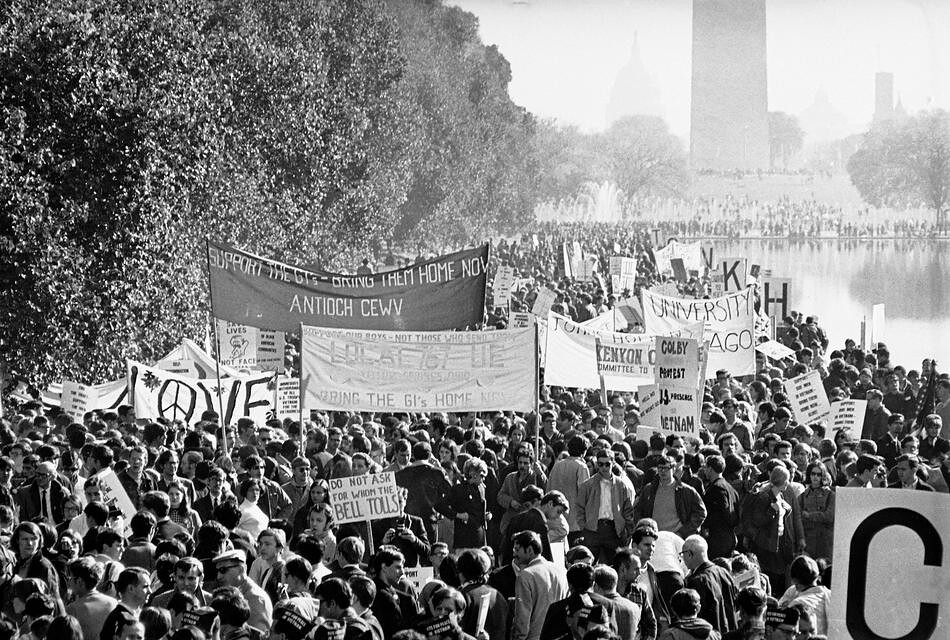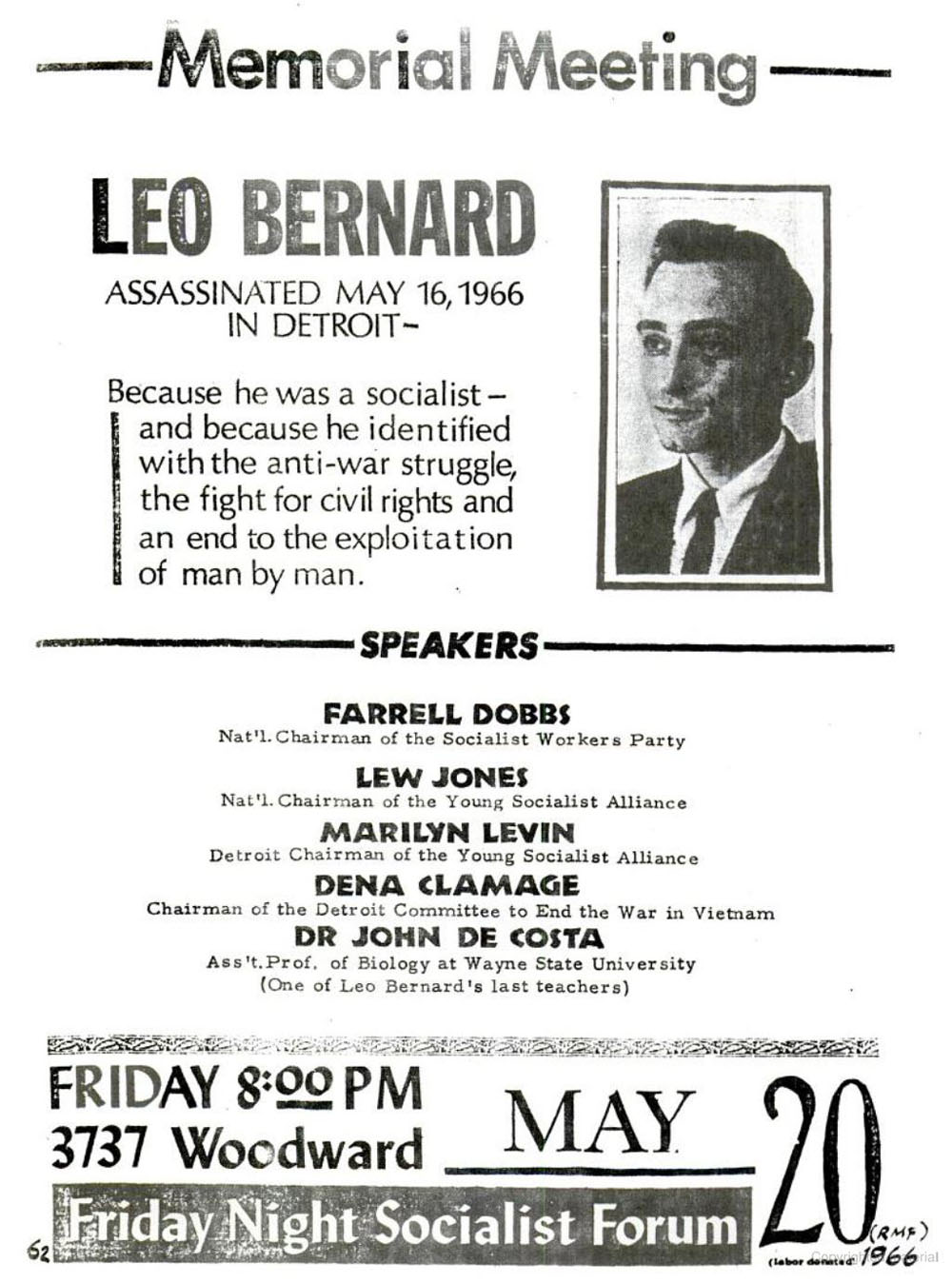Comrade Leo Bernard, 1939-1966

It was dangerous to be a dissenter in 1966. In April, the headquarters of the San Francisco-based, anti-Vietnam War, Vietnam Day Committee was firebombed. The Communist Party headquarters in New York City was bombed twice, once on May 2 and again on September 4. On March 6, the San Francisco headquarters of the W.E.B. Du Bois Club was bombed. On September 29, the New York branch of the Socialist Workers Party’s headquarters was also bombed. Christian peace activists Ivan von Auw Johnson and Addison Wilkins were both killed by supporters of the Vietnam War on March 4 and May 20 respectively. Civil Rights Movement martyrs Sammy Younge Jr., Vernon Dahmer, Clarence Triggs, and Ben Chester White were all murdered during that year. Closer to my home was the story of Leo Bernard, a student at my alma mater, Wayne State University.
Leo Bernard, born on October 28, 1938, spent his whole life in Detroit, Michigan. He graduated from Cass Technical High School and spent some time doing factory work as well as time in the Army Reserve. He attended Wayne State University, at first studying electrical engineering, but later switching to biology, in which he hoped to get a degree and become a freshwater biologist. While he was attending classes, he also was a medical worker at the Receiving Hospital of the Detroit Medical Center. By 1966, he had dropped out to work as a draftsman, but he wanted to return to school at some point to finish his schooling.
Bernard was very active politically. In 1964, at just 25 years old, he ran for Congress as the Socialist Workers Party (SWP) candidate in Michigan’s 17th Congressional district, based in Detroit. The following year, he became headquarters director for the party, which at that time counted George Breitman, pioneering compiler of Malcolm X Speaks as a member. Bernard was known to the Detroit Police Department, which kept surveillance on the Detroit Committee to End the War in Vietnam, the antiwar organization for which Bernard served as treasurer. The committee was founded in February 1965 as a broad front of members of Students for a Democratic Society, the Student Nonviolent Coordinating Committee, the Young Socialist Alliance (YSA), the SWP, and the W.E.B. Du Bois Clubs, along with other unaffiliated radicals. The committee was responsible for coordinating turnout at the April 17 antiwar demonstration in Washington D.C. In October 1965, this group sponsored a “teach-in” on the war in Vietnam at Wayne State’s Kresge Library, followed by a demonstration.

On May 16, 1966, Leo Bernard was at the SWP Detroit headquarters at Debs Hall on Woodward Avenue with Jan Garrett and Walter Graham, both Wayne State students and SWP activists. Graham graduated from Lake Shore High School in 1964, where my sister graduated around 50 years later. Garrett was from Florida. Both he and Graham initially attended Michigan State University before transferring to Wayne. Garrett had previously been president of MSU’s Young Socialist Club. Bernard was at the headquarters to dismantle the SWP’s piano, which was in such bad condition that it couldn’t be repaired. Garrett and Graham were busy mailing out party literature.
That afternoon an armed, unemployed ex-cab driver named Edward Waniolek entered the hall. In March, Waniolek had visited the South African embassy in New York asking to be admitted to that country since he viewed the United States as being “overrun with Communists.” The embassy told the Secret Service, which passed along the information to the Detroit Police Department that Waniolek had repeatedly threatened to kill Communists and that he was returning to Detroit to do so. Despite these warnings and a Secret Service visit to Waniolek’s home, during which his wife expressed her fears of her husband, no action was taken. Before he left for Debs Hall, he left his wife at the Detroit Public Library, telling her that he was going to “kill some Communists.” At 2:15, Mrs. Waniolek entered the Special Investigative Bureau of the DPD and told police that she was afraid her husband was going to kill someone.
When Waniolek entered Debs Hall, he found Garrett, Graham, and Bernard. At first he asked them for a list of books by Vladimir Lenin. Upon seeing the list, he told them “Line up against the wall. You’re all a bunch of Commies. Put your money on the floor.” At this point, Waniolek opened fire, hitting all three men before running back to the public library, leaving his victims behind in a pool of blood. Garrett was still able to move. He crawled more than 50 feet to reach the telephone to call the police. He got no answer, so he called George Breitman, a comrade in the SWP, telling him “I’ve been shot. I’m dying. I’ve tried to call the police but I can’t. I’ve tried.” At this point, he collapsed. A waitress at a nearby restaurant heard the shooting and also called the police.
Leo Bernard, Jan Garrett, and Walter Graham were all taken to Detroit General Hospital. Bernard had been shot once in the head and was pronounced dead on arrival. Garrett and Graham had each been shot four times but were still alive. Police arrived at the Detroit Public Library hours later, where they found Waniolek listening to Beethoven in the second-floor sound library. He had two rifles and a pistol with him but surrendered easily to the arresting officers.
By the next day, between 30 and 40 Wayne State and University of Michigan students arrived at the hospital to donate much-needed blood to help their fellow students. Most were not members of the SWP or the YSA but wanted to help anyway. Eventually, both Graham and Garrett recovered from the shooting after long periods of recuperation.
There was an outpouring of support for the shooting victims. The YSA sent solidarity telegrams to Garlene Bernard (Leo’s widow), Garrett, and Graham from their convention. The French Jeunesse Comuniste Revolutionaire sent a telegram to the YSA national convention paying tribute to the shooting victims. The Japanese Revolutionary Communist League released a statement calling Bernard “our American comrade”. Further statements of support came from Noam Chomsky, Staughton Lynd, A.J. Muste, the British International Socialist Group, and the Quebec Socialist Workers League. Appeals for medical aid for the victims appeared not only in the Militant but also in the underground Detroit newspaper the Fifth Estate.
Memorial meetings were held across the country. Ian Angus recalls that the New York memorial was attended by 400 people and addressed by Farrell Dobbs, the SWP presidential candidate and legendary Teamster activist, as well as radical pacifists David Dellinger and A.J. Muste. George Novack sent a basket around to collect pledges and cash to help pay for the medical treatment of Graham and Garrett. Notably, Tim Wheeler of the Communist Party called Leo Bernard “my comrade,” a remarkable statement, given the longtime rivalry between the Communists and the SWP. In Philadelphia, around 100 people attended a memorial. In Detroit, there were 150, including members of the SWP, the YSA, Students for a Democratic Society, and the C.L.R. James-influenced Facing Reality. Farrell Dobbs spoke in Detroit, and so did one of Bernard’s last professors, Dr. John De Costa.
Edward Waniolek was arraigned the day after the shooting. Both Graham and Garrett identified him from police photographs. A sanity commission hearing in June held that he was suffering from paranoid schizophrenia related to his delusions about Communist conspiracy and persecution. He was determined to be unable to assist in his own defense or understand the charges against him, and to have been “deranged” at the time of the shooting. The judge ordered him to be committed to the Ionia Mental Hospital until such a time he could be cured.
In the aftermath of the shooting, a campaign was launched to require the city of Detroit to pay the costs of the shooting. Jan Garrett’s medical bills totaled $2,200, Walter Graham’s were $2,300, and burial costs for Leo Bernard were $538. Attorney Ernest Goodman claimed that the city was negligent in not taking action to stop Waniolek prior to the shooting, despite multiple warnings. Michigan law contained a provision that allowed police to initiate commitment proceedings to a mental institution when the immediate family was unwilling to do so, provided that the person in question was dangerous to others. While Goodman’s petition was pending before Detroit’s Common Council, the Detroit Committee to End the War in Vietnam collected over 4,000 signatures from Wayne State students in support of the effort. Unfortunately, the Common Council voted unanimously to deny the petition on January 24, 1967. The same police department that could not prevent the shooting was somehow able to mobilize 200 cops to quell any potential disorder when the Common Council released their decision.

Garlene Bernard moved away from Detroit after her husband’s murder and dropped out of the public eye. Jay Garrett continued his activism with the SWP, and at some point he moved from Detroit to the Twin Cities. Walter Graham essentially disappears from the public record after making an appearance at a memorial meeting on the first anniversary of the shooting, so I have no knowledge of his activities thereafter. The shooter, Edward Waniolek, was released in 1974 when Ionia State Hospital closed. He never stood trial for the shooting. The campaign to aid the victims of the shooting was wound down in September 1967, having raised over $2,800. At this point, I would like to appeal to those with further knowledge of this case to contact me so more can be learned about it.
Since the shooting at Debs Hall more than five decades ago, the incident seems to have been mostly forgotten. SWP activist Barry Sheppard wrote a chapter on it in his book The Party: a Political Memoir. SWP Presidential candidate Peter Camejo makes a brief mention of Bernard’s murder in his memoir North Star. Finally, the killing was fictionalized in Peter Werbe’s novel Summer on Fire, although the author changed the names and dates, since he did not want to give publicity to an “authoritarian socialist organization.” I think the incident can be best commemorated by Jan Garrett’s statement:
Our job as socialists is “to cleanse life of all violence.” That was Leo’s belief too. Perhaps others of us will not survive the vicissitudes of the fight for that kind of future. But what that we can give unstintingly to that goal will be fully justified by the type of society our spiritual brothers, the vast majority, will build.
Featured Image Credit: Photo by PERSON; modified by Tempest.
Categories
We want to hear what you think. Contact us at editors@tempestmag.org. And if you've enjoyed what you've read, please consider donating to support our work:
DonateHank Kennedy View All
Hank Kennedy is a Detroit area socialist, educator, and longtime comic book fan.
